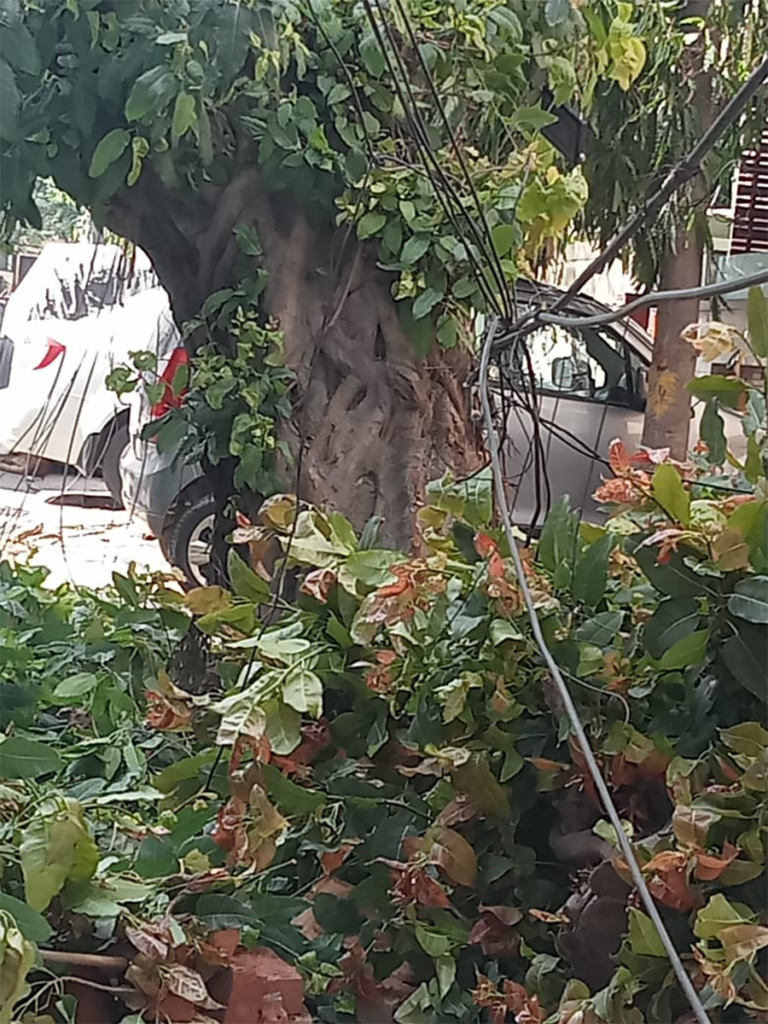The Offenders Must Be Brought To Books
In recent years, there has been a growing concern over the rampant tree cutting that is taking place in colonies and residential areas, often with the connivance of greedy builders and corrupt officials. This destructive practice not only leads to the loss of green cover and biodiversity but also has severe implications for the environment, exacerbating issues such as air pollution, climate change, and habitat destruction. Recently two huge precious trees have been cut in A1 and B5 block of our colony. Shall we all keep sitting like silent spectators to this massacre?
One of the main reasons behind the tree cutting in colonies is the insatiable greed of builders who prioritize profits over environmental conservation. Many builders view trees as obstacles to their construction projects and often resort to illegal tree cutting to make way for their developments. In some cases, they collude with corrupt officials who turn a blind eye to these illegal activities in exchange for bribes or other favors. This collusion between greedy builders and corrupt officials creates a vicious cycle that further damages the environment.
The impact of tree cutting in colonies goes beyond just the loss of trees. Trees play a crucial role in maintaining the ecological balance of an area. They act as carbon sinks, absorbing carbon dioxide and mitigating climate change. Trees also help in filtering the air, providing oxygen, and reducing air pollution. They provide habitat for various species of birds, insects, and other wildlife, contributing to biodiversity conservation. Moreover, trees also help in conserving water, preventing soil erosion, and regulating the microclimate of an area. Cutting down trees disrupts all these critical ecological functions, leading to severe environmental consequences.
Another concerning aspect of tree cutting in colonies is the violation of environmental laws and regulations. Most countries have laws in place to protect trees and forests, including urban trees in residential areas. However, greedy builders often flout these laws, and corrupt officials turn a blind eye to these violations, allowing the destruction of trees to go unchecked. This not only undermines the rule of law but also sets a dangerous precedent, encouraging others to follow suit and engage in illegal tree cutting activities.
The impact of tree cutting in colonies is not limited to the environment alone; it also has social and health implications. Trees are often an integral part of the local community and contribute to the overall well-being of residents. They provide shade, reduce heat island effect, and create a conducive environment for outdoor activities, thus promoting physical and mental health. The loss of trees in colonies can lead to increased temperatures, reduced air quality, and loss of recreational spaces, negatively impacting the health and well-being of residents, particularly vulnerable groups such as children and the elderly.
To combat the issue of greedy builders cutting trees in colonies with the connivance of officials, it is imperative to take immediate action at multiple levels. Strict enforcement of existing environmental laws and regulations, along with punitive measures against violators, is crucial. Corruption among officials must be tackled through transparent and accountable governance mechanisms. In addition, creating awareness among the public about the importance of trees and their conservation is essential. Communities can come together to resist illegal tree cutting activities and engage in tree planting and conservation efforts.
Furthermore, builders and developers must adopt sustainable and environmentally responsible practices in their construction projects. They should prioritize the preservation of existing trees and incorporate green spaces into their plans. Local authorities should also ensure that tree cutting is strictly regulated and only allowed under legitimate circumstances, such as when trees pose a safety risk or are part of a well-designed urban forestry plan.
In conclusion, the collusion between greedy builders and corrupt officials in cutting trees in colonies is a detrimental practice that damages the environment and has severe social, health, and legal implications. Urgent action is required at various levels to curb this destructive practice, including strict enforcement of environmental laws, transparent governance, community participation, and sustainable construction practices. It is time to prioritize environmental conservation over short-term profits.





Popular Stories
How To Revive Your Rainwater Harvesting System
The Water Couple’s Journey: From Cleaning Tanks to Complete Water Solutions!
Locals Felling Trees Near Sec A Pkt C
Winning Has Become a Habit for Divya
Is Green Park Heading Towards A Slum
Haphazard Parking, Narrow Walking Space In M Block Market
Recent Stories from Nearby
- Elections at Silver Oaks April 5, 2025
- Silver Oaks Rangotsav: A Vibrant Celebration of Holi April 5, 2025
- Sarvam Shakti: A Decade of Empowerment and Grace April 5, 2025
- Turning Waste into a Valuable Resource April 5, 2025
- Stray Dogs Menace & Management, A Block Extension April 5, 2025







